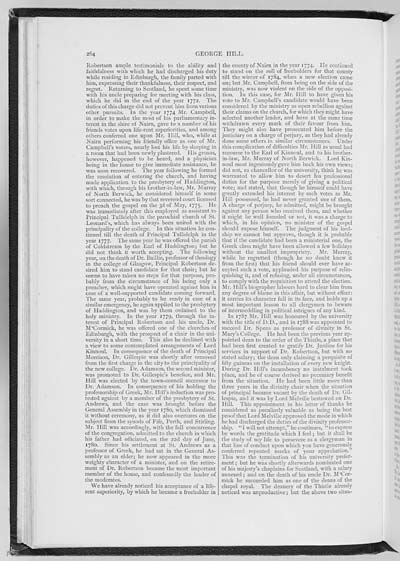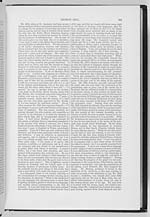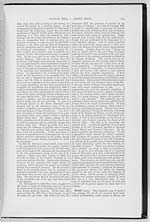264
Robertson ample testimonials to the ability and
faithfulness with which he had discharged his duty
while residing in Edinburgh, the family parted with
him, expressing their thankfulness, their respect, and
regret. Returning to Scotland, he spent some time
with his uncle preparing for meeting with his class,
which he did in the end of the year 1772. The
duties of this charge did not prevent him from various
other pursuits. In the year 1774 Mr. Campbell,
in order to make the most of his parliamentary in-
terest in the shire of Nairn, gave to a number of his
friends votes upon life-rent superiorities, and among
others conferred one upon Mr. Hill, who, while at
Nairn performing his friendly office as one of Mr.
Campbell's voters, nearly lost his life by sleeping in
a room that had been newly plastered. His groans,
however, happened to be heard, and a physician
being in the house to give immediate assistance, he
was soon recovered. The year following he formed
the resolution of entering the church, and having
made application to the presbytery of Haddington,
with which, through his brother-in-law, Mr. Murray
of North Berwick, he considered himself in some
sort connected, he was by that reverend court licensed
to preach the gospel on the 3d of May, 1775. He
was immediately after this employed as assistant to
Principal Tullidelph in the parochial church of St.
Leonard's, which has always been united with the
principality of the college. In this situation he con-
tinued till the death of Principal Tullidelph in the
year 1777. The same year he was offered the parish
of Coldstream by the Earl of Haddington; but he
did not think it worth accepting. The following
year, on the death of Dr. Baillie, professor of theology
in the college of Glasgow, Principal Robertson de-
sired him to stand candidate for that chair; but he
seems to have taken no steps for that purpose, pro-
bably from the circumstance of his being only a
preacher, which might have operated against him in
case of a well-supported candidate coming forward.
The same year, probably to be ready in case of a
similar emergency, he again applied to the presbytery
of Haddington, and was by them ordained to the
holy ministry. In the year 1779, through the in-
terest of Principal Robertson and his uncle, Dr.
M'Cormick, he was offered one of the churches of
Edinburgh, with the prospect of a chair in the uni-
versity in a short time. This also he declined with
a view to some contemplated arrangements of Lord
Kinnoul. In consequence of the death of Principal
Morrison, Dr. Gillespie was shortly after removed
from the first charge in the city to the principality of
the new college. Dr. Adamson, the second minister,
was promoted to Dr. Gillespie's benefice, and Mr.
Hill was elected by the town-council successor to
Dr. Adamson. In consequence of his holding the
professorship of Greek, Mr. Hill's induction was pro-
tested against by a member of the presbytery of St.
Andrews, and the case was brought before the
General Assembly in the year 1780, which dismissed
it without ceremony, as it did also overtures on the
subject from the synods of Fife, Perth, and Stirling.
Mr. Hill was accordingly, with the full concurrence
of the congregation, admitted to the church in which
his father had officiated, on the 22d day of June,
1780. Since his settlement at St. Andrews as a
professor of Greek, he had sat in the General As-
sembly as an elder; he now appeared in the more
weighty character of a minister, and on the retire-
ment of Dr. Robertson became the most important
member of the house, and confessedly the leader of
the moderates.
We have already noticed his acceptance of a life-
rent superiority, by which he became a freeholder in
the county of Nairn in the year 1774. He continued
to stand on the roll of freeholders for that county
till the winter of 1784, when a new election came
on; but Mr. Campbell, from being on the side of the
ministry, was now violent on the side of the opposi-
tion. In this case, for Mr. Hill to have given his
vote to Mr. Campbell's candidate would have been
considered by the ministry as open rebellion against
their claims on the church, for which they might have
selected another leader, and have at the same time
withdrawn every mark of their favour from him.
They might also have prosecuted him before the
justiciary on a charge of perjury, as they had already
done some others in similar circumstances. Under
this complication of difficulties Mr. Hill as usual had
recourse to the Earl of Kinnoul, and to his brother-
in-law, Mr. Murray of North Berwick. Lord Kin-
noul most ingeniously gave him back his own views;
did not, as chancellor of the university, think he was
warranted to allow him to desert his professional
duties for the purpose merely of giving a political
vote; and stated, that though he himself could have
greatly extended his interest by such votes as Mr.
Hill possessed, he had never granted one of them.
A charge of perjury, he admitted, might be brought
against any person who received them, and whether
it might be well founded or not, it was a charge to
which, in his opinion, no minister of the gospel
should expose himself. The judgment of his lord-
ship we cannot but approve, though it is probable
that if the candidate had been a ministerial one, the
Greek class might have been allowed a few holidays
without the smallest impropriety. Mr. Murray,
while he regretted (though he no doubt knew it
from the first) that his friend should ever have ac-
cepted such a vote, applauded his purpose of relin-
quishing it, and of refusing, under all circumstances,
to comply with the requisition to attend the election.
Mr. Hill's biographer labours hard to clear him from
any degree of blame in this affair, but without effect:
it carries its character full in its face, and holds up a
most important lesson to all clergymen to beware
of intermeddling in political intrigues of any kind.
In 1787 Mr. Hill was honoured by the university
with the title of D.D., and in 1788 was appointed to
succeed Dr. Spens as professor of divinity in St.
Mary's College. He had been the previous year ap-
pointed dean to the order of the Thistle, a place that
had been first created to gratify Dr. Jardine for his
services in support of Dr. Robertson, but with no
stated salary; the dean only claiming a perquisite of
fifty guineas on the installation of every new knight.
During Dr. Hill's incumbency no instalment took
place, and he of course derived no pecuniary benefit
from the situation. He had been little more than
three years in the divinity chair when the situation
of principal became vacant by the death of Dr. Gil-
lespie, and it was by Lord Melville bestowed on Dr.
Hill. This appointment in his letter of thanks he
considered as peculiarly valuable as being the best
proof that Lord Melville approved the mode in which
he had discharged the duties of the divinity professor-
ship. ''I will not attempt," he continues, "to express
by words the gratitude which I feel; but it shall be
the study of my life to persevere as a clergyman in
that line of conduct upon which you have generously
conferred repeated marks of your approbation."
This was the termination of his university prefer-
ment ; but he was shortly afterwards nominated one
of his majesty's chaplains for Scotland, with a salary
annexed; and on the death of his uncle Dr. M'Cor-
mick he succeeded him as one of the deans of the
chapel royal. The deanery of the Thistle already
noticed was unproductive; but the above two situa-

![]() Universal Viewer |
Universal Viewer | ![]() Mirador |
Large image | Transcription
Mirador |
Large image | Transcription
![]()

